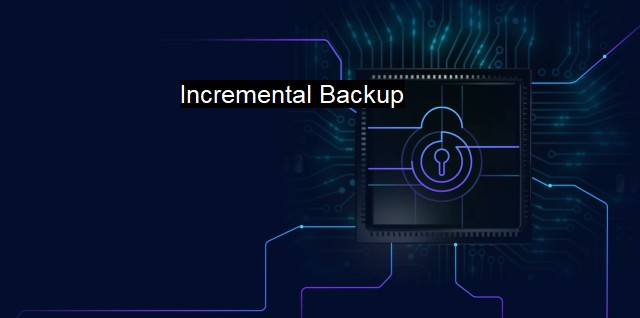What is Incremental Backup?
Secure and Efficient: Exploring the Benefits of Incremental Backup in Today's Cybersecurity Landscape
Incremental backup is a computer data archiving method used within the scope of cybersecurity and protection against malicious software, including antivirus programs. This term defines a type of backup process that only saves the changes made to the data since the last performed backup. This approach contrasts with other backup methodologies, such as full backups which duplicate entire datasets or systems, or differential backups that copy all changes made since the last full backup. The pivotal advantage of an incremental backup is that it minimizes the amount of time and storage space needed to perform backup operations while ensuring data protection and recovery capabilities in case of a data breach, corruption, loss, or failure.Incremental backup's basis lies in its space and time efficiency. Traditional full back up methods could prevent precious time and system resources being unnecessarily used up. As an example, imagine a company has 10 terabytes of data that changes by about 10 gigabytes each day. Instead of copying the entire 10 terabyte dataset daily, which would require significant time and storage infrastructure; an incremental backup approach would only copy the 10 gigabytes of modified or newly added data, enabling speedier backups and far more efficient use of storage space.
Incremental backups' strength is in the granular control they provide over data backup. Cyber threats, such as ransomware or malware attack, could render a complete backup corrupted or inaccessible, but an incremental backup provides more snapshots of data at various moments, mitigating the risk of complete data loss and giving a 'roll-back' option to a moment just before the cyberattack impact.
Correspondingly, in terms of anti-virus protection, incremental backups safeguard against threats that traditional antivirus systems might have missed or nullified. Antivirus software typically scans for known patterns or actors related to threats. new or sophisticated threats can sometimes bypass these detection mechanisms. Through incremental back-ups that frequently capture the changing state of system data, businesses can restore their systems to its pre-attack state in a worst-case scenario, such as after an advanced persistent threat, an undetected virus, or accidental data loss.
It is crucial to be aware, though, that while incremental backup systems have many benefits, they also come with their own challenges that may pose certain risks. One such challenge is the increased complexity of restoring from multiple incremental backups. Since the backup set consists of separate and distinct chunks, these need to be pieced together in the right order to glean a complete data recovery.
There is an increased risk of failure; if just one of the many incremental backup pieces gets corrupted or missing, it can render the entire backup suite unreadable or useless, potentially leading to data loss. Therefore, increased administrative control, testing, and management are vital to deal with these potential challenges effectively.
Another aspect to consider is the role of encryption therein. To prevent any unauthorized access to sensitive and valuable data, encryption key management and practices must be in place. This in combination with incremental backup will contribute collaborating safety standards against cyber threats.
Despite these challenges, the significance of incremental backups in the combine use with antivirus solutions and comprehensive cybersecurity strategies can't be overstated, they offer a robust, space efficient and time-saving method, which allows minimizing data loss risk while maintaining operational continuity in the ever-evolving landscape of cybersecurity threats.

Incremental Backup FAQs
What is an incremental backup?
An incremental backup is a backup strategy that involves copying only the data that has changed since the last backup. This approach is often used in cybersecurity and antivirus protection to ensure that important data is always up-to-date and secure.How does incremental backup differ from other backup strategies?
Unlike full backup, which involves copying all data each time it is backed up, an incremental backup copies only the data that has changed. This means that incremental backups can be faster and require less storage space. However, they also require more complex backup software to manage the multiple backup sets.What are the benefits of using incremental backup for cybersecurity and antivirus protection?
Incremental backups provide a high level of protection against data loss and corruption, as they create multiple copies of data over time. This allows for the easy restoration of data to a specific point in time, in case of a cyber attack or other security threat. Additionally, incremental backups require less storage space and can be performed more frequently, leading to minimal data loss in the event of an incident.How often should incremental backups be performed for cybersecurity purposes?
The frequency of incremental backups will depend on the level of risk associated with the data being protected. For critical data, incremental backups may be performed hourly or daily, while less important data may only require weekly or monthly backups. It is important to regularly review and update backup strategies to ensure optimal cybersecurity and antivirus protection.| | A | | | B | | | C | | | D | | | E | | | F | | | G | | | H | | | I | | | J | | | K | | | L | | | M | |
| | N | | | O | | | P | | | Q | | | R | | | S | | | T | | | U | | | V | | | W | | | X | | | Y | | | Z | |
| | 1 | | | 2 | | | 3 | | | 4 | | | 7 | | | 8 | | |||||||